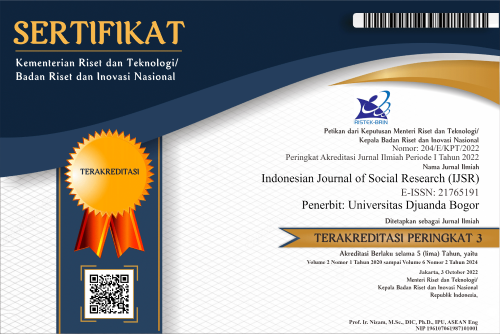Instructor-Driven Causes and Impacts of Grade Inflation in Philippine Higher Education
Abstract
Grade inflation in Philippine higher education is a growing concern, with instructors increasingly assigning higher grades to students. This paper investigates instructor-driven causes behind grade inflation and its impacts. Autoethnography was used as a method. The study locale was public state universities and colleges in Taguig City and Muntinlupa City, Philippines; data collection involved immersion, a personal diary, and informal discussions with faculty and students. Thematic analysis, guided by research inquiries, unveiled the factors driving this trend. Results suggest compassionate grading, influenced by a desire to support students facing challenges, fosters inflated success perceptions. Laziness, apathy, and sycophancy also contribute to lax grading, hindering genuine academic growth. Meanwhile, the impacts extend beyond academia, affecting graduates' skill acquisition and potentially dissatisfying employers. Recommendations advocate for enhanced accountability among instructors through rigorous evaluation systems and continuous professional development to safeguard academic standards. Combating grade inflation necessitates collaborative efforts to uphold education quality and integrity, benefiting students, institutions, and society.
References
Arao, D. (2022). UPD FYI: At the University Council meeting this morning, it appears that this graduating batch has 1,433 students graduating with Latin honors (i.e., 634 cum laude, 652 magna cum laude, and 147 summa cum laude). Congratulations but we should seriously discuss grade hyperinflation. https://twitter.com/dannyarao/status/1549567260754591745
Arora, P. G., Sullivan, A. L., & Song, S. Y. (2023). On the imperative for reflexivity in school psychology scholarship. School Psychology Review, 52(5), 665–677.
Bachan, R. (2017). Grade inflation in UK higher education. Studies in Higher Education, 42(8), 1580–1600.
Baglione, S. L., & Smith, Z. (2022). Grade inflation: Undergraduate students’ perspective. Quality Assurance in Education, 30(2), 251–267.
Braun, V., & Clarke, V. (2012). Thematic analysis. In H. Cooper, P. M. Camic, D. L. Long, A. T. Panter, D. Rindskopf, & K. J. Sher (Eds.), APA handbook of research methods in psychology, Vol 2: Research designs: Quantitative, qualitative, neuropsychological, and biological. (pp. 57–71). American Psychological Association. https://doi.org/10.1037/13620-004
Caplan, B. (2018). The case against education: Why the education system wastes time and money. Princeton University Press.
Cheng, L., DeLuca, C., Braund, H., & Yan, W. (2018). Grading policies in Canada and China: A comparative study. Comparative and International Education, 47(1).
Chowdhury, F. (2018). Grade inflation: Causes, consequences and cure. Journal of Education and Learning, 7(6), 86–92.
Contreras, A. (2024, April 16). Inflation of honors and academic ranks. https://www.manilatimes.net/2022/07/26/opinion/columns/inflation-of-honors-and-academic-ranks/1852275
Cooper, R., & Lilyea, B. (2022). I’m interested in autoethnography, but how do I do it. The Qualitative Report, 27(1), 197–208.
Coughlin, P. (2016). No more Christian nice guy: When being nice—instead of good—hurts men, women, and children. Baker Books.
David, R. (2022, July 24). The phenomenon of ‘grade inflation.’ https://opinion.inquirer.net/155366/the-phenomenon-of-grade-inflation
Dweck, C. S. (2006). Mindset: The new psychology of success. Random House.
Gelber, K., Brennan, K., Duriesmith, D., & Fenton, E. (2022). Gendered mundanities: Gender bias in student evaluations of teaching in political science. Australian Journal of Political Science, 57(2), 199–220.
Griffin, R., & Townsley, M. (2021). Points, points, and more points: High school grade inflation and deflation when homework and employability scores are incorporated. Journal of School Administration Research and Development, 6(1), 1–11.
Hofstede, G. (1984). Culture’s consequences: International differences in work-related values (Vol. 5). Sage.
Hornstein, H. A. (2017). Student evaluations of teaching are an inadequate assessment tool for evaluating faculty performance. Cogent Education, 4(1), 1304016.
Hoversten, C. (1990). Teacher to teacher: Five antidotes for teacher apathy. Middle School Journal, 21(4), 16–17.
Jamison, L. (2014). The empathy exams: Essays. Graywolf Press.
Macailing, R., Rellon, J., & Bernaldez, N. (2022). Causes of students ‘grade inflation in pandemic: exploratory sequential design. Southeast Asian Journal of Multidisciplinary Studies, 2(2), 1-18.
Madsen, T. (2018). The conception of laziness and the characterisation of others as lazy. Human Arenas, 1(3), 288–304.
Marinakis, Y. D., & White, R. (2022). Hyperinflation potential in commodity-currency trading systems: Implications for sustainable development. Sustainable Technology and Entrepreneurship, 1(1), 100003.
Nilson, L. B. (2016). Teaching at its best: A research-based resource for college instructors. John Wiley & Sons.
Nordin, M., Heckley, G., & Gerdtham, U. (2019). The impact of grade inflation on higher education enrolment and earnings. Economics of Education Review, 73, 101936.
Olmos-Vega, F. M., Stalmeijer, R. E., Varpio, L., & Kahlke, R. (2023). A practical guide to reflexivity in qualitative research: AMEE Guide No. 149. Medical Teacher, 45(3), 241–251.
Rindermann, H., & Becker, D. (2023). The future of intelligence: A prediction of the FLynn effect based on past student assessment studies until the year 2100. Personality and Individual Differences, 206, 112110.
Sarao, Z. (2022, Agustus). UP lifts pandemic-related regulations including no-fail policy. https://newsinfo.inquirer.net/1655036/up-lifts-pandemic-related-regulations-including-no-fail-policy
Scutti, S. (2017, December). The psychology of sycophants. https://edition.cnn.com/2017/12/22/health/psychology-of-sycophancy/index.html
Seltzer, L. F. (2008, June 23). Laziness: Fact or fiction? https://www.psychologytoday.com/us/blog/evolution-of-the-self/200806/laziness-fact-or-fiction
Srijan Pal Singh. (2019, June 6). Board Examinations: Where grade inflation met quality deflation. https://www.indiatoday.in/education-today/featurephilia/story/board-examinations-where-grade-inflation-met-quality-deflation-1542107-2019-06-04
Stevenson, A. (2010). Oxford dictionary of English. Oxford University Press, USA.
Tilbury, D. (2011). Education for sustainable development: An expert review of processes and learning.
Yeritsyan, A., Mjelde, J. W., & Litzenberg, K. K. (2022). Grade inflation or grade increase. Journal of Agricultural and Applied Economics, 54(2), 375–393.
Copyright (c) 2024 Indonesian Journal of Social Research (IJSR)

This work is licensed under a Creative Commons Attribution-ShareAlike 4.0 International License.
The Authors submitting a manuscript do so on the understanding that if accepted for publication, copyright publishing of the article shall be assigned/transferred to Indonesian Journal of Social Research (IJSR) Universitas Djuanda as Publisher of the journal. Upon acceptance of an article, authors will be asked to complete a 'Copyright Transfer Agreement'. An e-mail will be sent to the corresponding author confirming receipt of the manuscript together with a 'Copyright Transfer Agreement' form by online version of this agreement.
Indonesian Journal of Social Research (IJSR) Universitas Djuanda, the Editors and the Editorial Board make every effort to ensure that no wrong or misleading data, opinions or statements be published in the journal. In any way, the contents of the articles and advertisements published in the Indonesian Journal of Social Research (IJSR) Universitas Djuanda are sole and exclusive responsibility of their respective authors and advertisers.
Remember, even though we ask for a transfer of copyright, our journal authors retain (or are granted back) significant scholarly rights as mention before.
The Copyright Transfer Agreement (CTA) Form can be downloaded here: Copyright Transfer Agreement-IJSR 2020
The copyright form should be signed electronically and send to the Editorial Office e-mail below:
Dr. Rasmitadila, M.Pd (Editor-in-Chief)
Universitas Djuanda
Jl. Tol Jagorawi No.1, Ciawi, Kec. Ciawi, Bogor, Jawa Barat 16720
Website: http://journal.unida.ac.id/index.php/IJSR/index
Email: ijsr@unida.ac.id





4.png)



